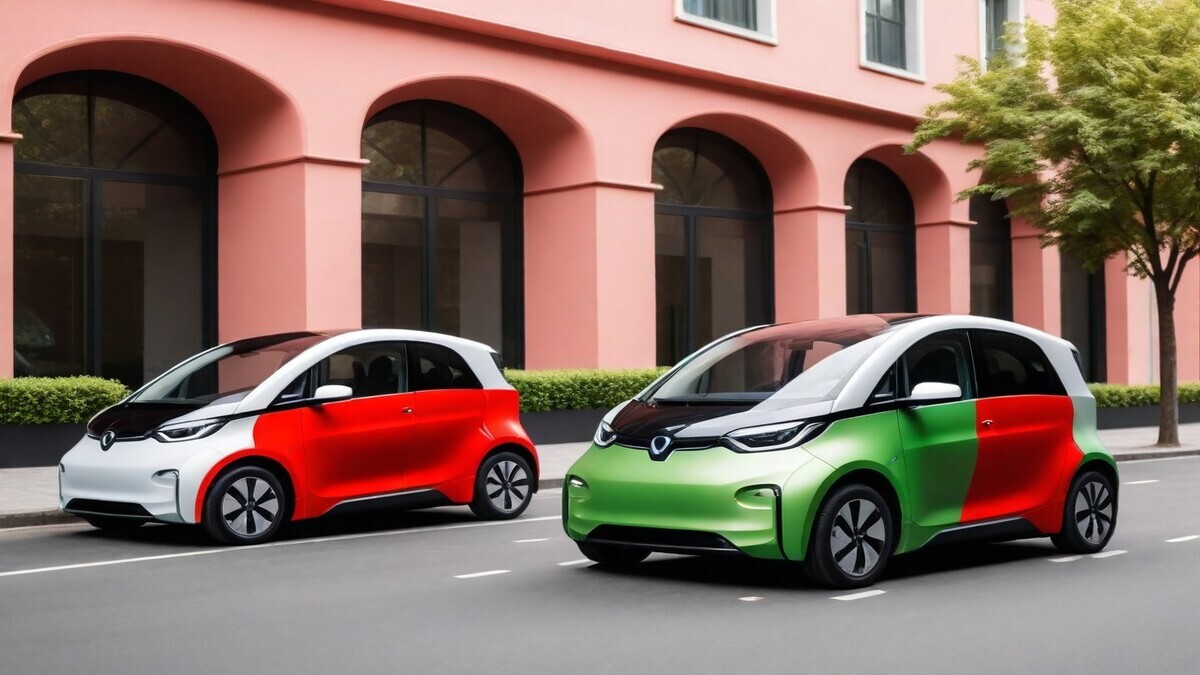Beyond individual companies, a new trend is emerging: the formation of EV consortiums. These groups, composed of automakers, energy companies, and government entities, are working together to overcome key challenges in EV adoption.
For example, the Ionity consortium, backed by major automakers like BMW, Ford, Hyundai, Kia, Mercedes-Benz, Porsche, and Volkswagen, is building a network of high-powered charging stations across Europe. Similarly, the Electrify America network, established by Volkswagen in the US, is expanding charging infrastructure to make long-distance travel in EVs more convenient.

These collaborations highlight the industry’s commitment to building a robust charging infrastructure, a critical factor in overcoming range anxiety and encouraging widespread EV adoption.
By integrating these sections on the competition landscape and industry collaborations, your article paints a more comprehensive picture of the forces driving the EV revolution. It showcases not just individual companies, but the collective effort that’s propelling electric vehicles towards a dominant position in the future of transportation.
Electric Vehicles Power Up A Look at Current Sales Trends and the Road Ahead
The roar of engines is slowly being replaced by a quiet hum as electric vehicles (EVs) surge in popularity. This surge is driven by a confluence of factors – environmental concerns, government incentives, and technological advancements. This article dives into the current trends of EV sales, explores the competition between industry leaders, and examines the factors shaping the future of electric mobility.
Tesla vs. The Pack: A Financial Showdown
Tesla has long been the poster child for electric vehicles, synonymous with innovation and disruption. However, traditional auto giants like General Motors (GM) are making significant strides. While Tesla often boasts higher earnings, reflecting its current dominance, GM leverages vast experience and resources to challenge this lead.
Green Lights for EV Growth
Several forces are accelerating the global EV sales boom. Heightened environmental awareness, coupled with stricter emissions regulations, is pushing consumers and manufacturers towards cleaner transportation solutions. Additionally, battery technology advancements are making EVs more affordable, practical, and desirable for everyday drivers.
Government Support Paves the Way
Government incentives play a vital role in EV adoption. Subsidies, tax credits, and other financial rewards offset the higher upfront costs of EVs, making them more accessible. Countries like Norway and China, with generous incentives, have witnessed dramatic increases in EV sales.
Navigating the EV Supply Chain Challenge
Despite the rising demand, manufacturers face significant supply chain hurdles. Issues like raw material sourcing, battery production, and infrastructure development pose obstacles to scaling up EV production. The global chip shortage further complicates matters, leading to production delays and inventory shortages.
Tech Innovation Charges Up the Market
Technological breakthroughs continue to propel the EV market forward. Advances like solid-state batteries and fast-charging solutions promise to enhance performance, range, and affordability of EVs. Moreover, the proliferation of autonomous driving features and connectivity solutions is reshaping mobility, making EVs even more attractive.
GM Shifts Gears Towards Electrification
Recognizing the growing demand, GM has embarked on an ambitious strategy to expand its EV lineup and infrastructure. The company plans to launch multiple electric models across various brands, catering to diverse consumer preferences. Additionally, GM invests heavily in charging infrastructure and renewable energy initiatives to support widespread EV adoption.
Consumers Plug into Electric Mobility
Consumer acceptance of EVs is on the rise, driven by environmental consciousness, rising fuel prices, and air pollution concerns. Improvements in EV technology, like extended range and faster charging, are dispelling common myths and misconceptions about electric vehicles.
The Battery: The Heart of the EV
Battery technology plays a central role in the EV industry, influencing everything from performance and range to cost and sustainability. Advancements in battery chemistry and manufacturing have led to significant improvements in energy density, longevity, and safety, making EVs more competitive with gasoline-powered cars. As battery costs continue to decline and energy density increases, EVs are expected to become even more mainstream.
Regulations Steer the Course for Manufacturers
The regulatory landscape significantly impacts the future of EVs. Emissions standards, fuel economy regulations, and government policies can have profound implications for automakers, influencing everything from vehicle design and production to sales and marketing strategies. As governments implement stricter emissions targets and phase out fossil fuel vehicles, automakers must adapt and innovate to remain competitive in an increasingly electric market.
The Road Ahead: A Sustainable Future
The electric vehicle market is poised for explosive growth, driven by a combination of technological advancements, regulatory mandates, and shifting consumer preferences. As EVs become mainstream, automakers must continue to invest in innovation, sustainability, and infrastructure to capitalize on this transformative shift in transportation. By embracing electrification, manufacturers can not only meet the evolving needs of consumers but also contribute to a cleaner, more sustainable future for all.
FAQs:
Are electric vehicles more expensive? While upfront costs might be higher, EVs often offer lower operating and maintenance costs over their lifetime, making them a cost-effective choice in the long run.
How far can electric vehicles travel on a single charge? The range varies depending on factors like battery size, driving conditions, and vehicle efficiency. Modern EVs typically offer ranges of 200 miles or more on a single charge.
Are there enough charging stations? The availability of charging infrastructure varies by region, but governments and private companies are investing heavily in expanding the network to accommodate the growing number of EVs on the road.
Do electric vehicles require special maintenance? EVs generally require less maintenance than gasoline-powered cars due to fewer moving parts and no oil changes. However, routine maintenance like tire rotations and brake inspections is still necessary.
How long does it take to charge an electric vehicle? Charging times vary depending on the charging method and battery capacity. With fast-charging stations, some EVs can charge to 80% capacity in as little as 30 minutes.




